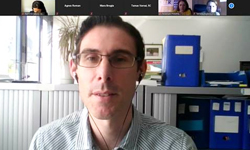BusinessEurope Headlines No. 2020-30
Three key actions for SMEs to take off

“The Commission’s SME strategy has a strong role to play in bringing coherence and consistency in what the EU does to support SMEs. To make Europe better, more competitive and able to lead, it is now more than ever crucial to prioritise areas that could benefit SMEs in the short and medium term”, said BusinessEurope Director General Markus J. Beyrer during an event jointly organised by BusinessEurope, EUROCHAMBRES and SMEunited on 23 September. European Commissioner for Internal Market, Thierry Breton, German Federal Minister for Economic Affairs and Energy, Peter Altmaier, and the Co-Chair of the European Parliament SME Intergroup, MEP Martina Dlabajová, participated in the event. Beyrer highlighted three priority points: first, it is important to facilitate the involvement of SMEs in European Green Deal projects, while taking account of their specificities; second, the EU should continue to explore instruments that facilitate easier expansion of SMEs activities in the EU, such as a European company law form designed for SMEs; third, the market-based development of alternative financing sources, such as equity and venture capital, should be encouraged, and a tailored implementation of the reform of Basel III preventing increasing excessively the cost of capital should be ensured.
Contact: Daniele Olivieri
Can trade support climate ambitions? Pascal Lamy's views
Pascal Lamy, President Emeritus of Jacques Delors Institute and former WTO Director General, shares his views on if and how trade can support climate ambitions, in reaction to BusinessEurope's position paper "What trade can do for climate".
Trade and Climate Apéro event: multilateral agenda discussed
 On 17 September the first edition of BusinessEurope's Trade and Climate online Apéro event had the pleasure to host Alan Wolff, Deputy Director General of World Trade Organisation and Carl Reaich, Ambassador of New Zealand to the European Union. The discussion focused on the various multilateral initiatives to create synergies between trade and climate objectives within the World Trade Organisation, as well as on plurilateral initiatives like the Agreement on Climate Change, Trade and Sustainability in which New Zealand participates. In the second Trade and Climate Apéro that will take place in October, we will have the opportunity to discuss the EU's bilateral policy agenda, while in the third edition of the event, planned for November, we will focus on the EU's unilateral agenda, including the discussion over the adoption of a Carbon Border Adjustment mechanism. This series of events is a follow up on BusinessEurope’s position paper “What trade can do for climate” published in June 2020.
On 17 September the first edition of BusinessEurope's Trade and Climate online Apéro event had the pleasure to host Alan Wolff, Deputy Director General of World Trade Organisation and Carl Reaich, Ambassador of New Zealand to the European Union. The discussion focused on the various multilateral initiatives to create synergies between trade and climate objectives within the World Trade Organisation, as well as on plurilateral initiatives like the Agreement on Climate Change, Trade and Sustainability in which New Zealand participates. In the second Trade and Climate Apéro that will take place in October, we will have the opportunity to discuss the EU's bilateral policy agenda, while in the third edition of the event, planned for November, we will focus on the EU's unilateral agenda, including the discussion over the adoption of a Carbon Border Adjustment mechanism. This series of events is a follow up on BusinessEurope’s position paper “What trade can do for climate” published in June 2020.
![]() Contact: Jasmin Ploner/ Leon de Graaf
Contact: Jasmin Ploner/ Leon de Graaf
Commissioner Reynders discusses data flows with business organisations
 On 21 September at a roundtable discussion organised by Didier Reynders, European Commissioner for Justice, BusinessEurope’s Director for Internal Market, Martynas Barysas, shared his views on the implications of the European Court of Justice (ECJ) “Schrems II” ruling that invalidated the EU-US Privacy Shield for data flows across the Atlantic. The roundtable exchange was held to identify best ways to comply with the ruling as well as to discuss necessary steps ahead, as it changed the framework for international personal data flows fundamentally.
On 21 September at a roundtable discussion organised by Didier Reynders, European Commissioner for Justice, BusinessEurope’s Director for Internal Market, Martynas Barysas, shared his views on the implications of the European Court of Justice (ECJ) “Schrems II” ruling that invalidated the EU-US Privacy Shield for data flows across the Atlantic. The roundtable exchange was held to identify best ways to comply with the ruling as well as to discuss necessary steps ahead, as it changed the framework for international personal data flows fundamentally.
A number of business organisations participated in this exchange with the Commissioner and shared their views. It was encouraging to hear everybody’s commitment to finding a credible solution for businesses both in the short and longer term, and that both the EU and US administrations are working in this regard. On the EU side, an update to the Standard Contractual Clauses (SCCs) as a valid instrument for data transfers, as well as the European Data Protection Board’s guidance on compliance are being drafted.
The participants agreed that this ECJ ruling affects not only the technology sector companies but the European economy at large, at this very moment of Europe’s digital transition. Importantly, there was acknowledgement that the “Schrems II” ruling was not only about the EU-US data transfers but all international data flows in a broad sense. These far-reaching implications call for a very comprehensive solution on compliance tools.
“International data transfer mechanisms are not a tool for big-tech companies only. All businesses in digital transformation in Europe, including those not making international data transfers themselves but relying on business services of others that do, are affected”, Barysas said, adding that “it is also a question of that ongoing European debate about the digital or technological sovereignty, and Europe should not shoot at its own feet”.
As far as numerous concerns around a possible protectionist move by Europe when choosing the ways of complying with this ECJ ruling are concerned, participants stressed that it should not be about closing the borders through data localisation (in the EU) requirements. While promoting data protection (GDPR) globally, we should remain open to organise transfers when adequate protection is demonstrated.
Additional consultations with stakeholders are expected to seek opinions on the updates of SCCs, as well as with regard to the draft guidance of the European Data Protection Board (EDPB). BusinessEurope also intends to send a letter on the latter to the EDPB in the very coming days.
Contact: Martynas Barysas
Unlocking the transatlantic relationship
 On 23 September, Luisa Santos, Deputy Director General of BusinessEurope took part in the webinar “EU and USA: How to Build a Positive Agenda”, organized by the American Institute for Contemporary German Studies (AICGS) at Johns Hopkins University in Washington to discuss the recent BusinessEurope’s position paper. "The idea of establishing a formal strategic dialogue at the highest political level between the European Union and the United States is key to prevent conflicts that could further jeopardise the Transatlantic Partnership and define coordinated approaches to address challenges like those presented by emerging countries and declining multilateralism”, she said. In its newly published strategic paper on transatlantic relations, BusinessEurope also recommends other avenues for joint cooperation including standard setting or building more resilient supply chains, for instance in the healthcare sector. “The pandemic crisis has shown that you can only address global problems in a cooperative way and not by building artificial borders. There is scope for the EU and the USA to work together in making supply chains more resilient to external chocs”, Santos said.
On 23 September, Luisa Santos, Deputy Director General of BusinessEurope took part in the webinar “EU and USA: How to Build a Positive Agenda”, organized by the American Institute for Contemporary German Studies (AICGS) at Johns Hopkins University in Washington to discuss the recent BusinessEurope’s position paper. "The idea of establishing a formal strategic dialogue at the highest political level between the European Union and the United States is key to prevent conflicts that could further jeopardise the Transatlantic Partnership and define coordinated approaches to address challenges like those presented by emerging countries and declining multilateralism”, she said. In its newly published strategic paper on transatlantic relations, BusinessEurope also recommends other avenues for joint cooperation including standard setting or building more resilient supply chains, for instance in the healthcare sector. “The pandemic crisis has shown that you can only address global problems in a cooperative way and not by building artificial borders. There is scope for the EU and the USA to work together in making supply chains more resilient to external chocs”, Santos said.
![]() Contact: Eleonora Catella
Contact: Eleonora Catella
Accessible and affordable childcare essential to allow more parents to work
 How can the EU support Member States in improving provision and affordability of childcare, to ensure that parents, in particular women, participate more in the labour market? This was one of the key questions for discussion at the European Social Partners 17 September meeting on childcare. This is part of a series of meetings on improving performance of labour markets and social systems, including through the European Semester. Experts from the European Commission, the Organisation for Economic Co-operation and Development (OECD), the Social Protection Committee and Eurofound discussed with EU and national social partners how to channel EU finances to childcare, how to ensure effective spending, and the involvement of social partners. The value of work and staffing issues in childcare were also discussed.
How can the EU support Member States in improving provision and affordability of childcare, to ensure that parents, in particular women, participate more in the labour market? This was one of the key questions for discussion at the European Social Partners 17 September meeting on childcare. This is part of a series of meetings on improving performance of labour markets and social systems, including through the European Semester. Experts from the European Commission, the Organisation for Economic Co-operation and Development (OECD), the Social Protection Committee and Eurofound discussed with EU and national social partners how to channel EU finances to childcare, how to ensure effective spending, and the involvement of social partners. The value of work and staffing issues in childcare were also discussed.
Contact: Rebekah Smith
Increasing in-company training time is key for a successful apprenticeship
 A key motivating factor for companies in taking on apprentices is the ability to train a person in a company over a pro-longed period of time. In this way the apprentice not only learns a defined set of skills according to the curricula, but learns to use them in a way that is productive in terms of understanding the products, services and processes that makes those skills valuable to a particular company. Such company experience also makes apprentices employable. Many countries still need to improve their apprenticeship schemes to increase the amount of training time that takes place in companies. This was a key message given by Robert Plummer, Senior Adviser, during a policy-learning forum on apprenticeships, which was organised by the European Center for the Development of Vocational Training (Cedefop) on 18 September. To make progress, it is important to explore within the national context how to support companies, particularly SMEs, to work towards realising one of the aims of the Council Recommendation on Quality and Effective Apprenticeships, which is that a majority of the training time should be in the workplace.
A key motivating factor for companies in taking on apprentices is the ability to train a person in a company over a pro-longed period of time. In this way the apprentice not only learns a defined set of skills according to the curricula, but learns to use them in a way that is productive in terms of understanding the products, services and processes that makes those skills valuable to a particular company. Such company experience also makes apprentices employable. Many countries still need to improve their apprenticeship schemes to increase the amount of training time that takes place in companies. This was a key message given by Robert Plummer, Senior Adviser, during a policy-learning forum on apprenticeships, which was organised by the European Center for the Development of Vocational Training (Cedefop) on 18 September. To make progress, it is important to explore within the national context how to support companies, particularly SMEs, to work towards realising one of the aims of the Council Recommendation on Quality and Effective Apprenticeships, which is that a majority of the training time should be in the workplace.
![]() Contact: Robert Plummer
Contact: Robert Plummer
Outlook on EU industrial strategy
 On 18 September Advisor Antonia Bierbaumer discussed the EU industrial strategy with members of the Consultative Committee of the European Economic Area. The advisory body aims to strengthen contacts between the European Free Trade Association (EFTA) and EU social partners. “A coordinated EU industrial strategy is key for Europe to meet its full economic and technological potential and to successfully recover from the unprecedented economic collapse caused by the COVID-19 pandemic”, she stated. Bierbaumer outlined the key role of industry in promoting the green and digital transition and the need to further strengthen cross-border industrial cooperation to pave the way for large industrial projects. At the same time, the challenges of the transition must not be overlooked. The risk of carbon and investment leakage as well as a distorted level playing field due to foreign subsidies and state-owned enterprises are obvious challenges for companies. The announced revision of the industrial strategy for the first half of 2021 must seize the opportunity and address issues that are currently not sufficiently taken into account.
On 18 September Advisor Antonia Bierbaumer discussed the EU industrial strategy with members of the Consultative Committee of the European Economic Area. The advisory body aims to strengthen contacts between the European Free Trade Association (EFTA) and EU social partners. “A coordinated EU industrial strategy is key for Europe to meet its full economic and technological potential and to successfully recover from the unprecedented economic collapse caused by the COVID-19 pandemic”, she stated. Bierbaumer outlined the key role of industry in promoting the green and digital transition and the need to further strengthen cross-border industrial cooperation to pave the way for large industrial projects. At the same time, the challenges of the transition must not be overlooked. The risk of carbon and investment leakage as well as a distorted level playing field due to foreign subsidies and state-owned enterprises are obvious challenges for companies. The announced revision of the industrial strategy for the first half of 2021 must seize the opportunity and address issues that are currently not sufficiently taken into account.
Contact: Antonia Bierbaumer
Debating current OECD Tax negotiations
 “Any solution found at the Organisation for Economic Co-operation and Development (OECD) should tax net profits once and never revenue, with the new rules being as simple to administer as possible" - This was the key message of Krister Andersson, Chair of BusinessEurope’s Tax Policy Working Group, at the event Unintended and Undesired Consequences – The Impacts of OECD Pillar I and II Proposals on Small Open Economies, organised by the European Centre for International Political Economy (ECIPE) on 22 September. Speaking alongside representatives from ECIPE, Tax Foundation and CopenhagenEconomics, Andersson reflected on the on-going OECD negotiations on new tax rules, regarding the taxation of digital companies and a minimum corporate tax rate. He underlined that the OECD should also take account in these discussions countries’ right to initiate an incentive-driven tax framework through transparent and fair tax competition, which attracts Foreign Direct Investment, Research and Development, and employment, in particular for smaller countries.
“Any solution found at the Organisation for Economic Co-operation and Development (OECD) should tax net profits once and never revenue, with the new rules being as simple to administer as possible" - This was the key message of Krister Andersson, Chair of BusinessEurope’s Tax Policy Working Group, at the event Unintended and Undesired Consequences – The Impacts of OECD Pillar I and II Proposals on Small Open Economies, organised by the European Centre for International Political Economy (ECIPE) on 22 September. Speaking alongside representatives from ECIPE, Tax Foundation and CopenhagenEconomics, Andersson reflected on the on-going OECD negotiations on new tax rules, regarding the taxation of digital companies and a minimum corporate tax rate. He underlined that the OECD should also take account in these discussions countries’ right to initiate an incentive-driven tax framework through transparent and fair tax competition, which attracts Foreign Direct Investment, Research and Development, and employment, in particular for smaller countries.
Contact: Pieter Baert
Calendar 
- 12-16 October: 18th European Week of Regions and Cities
- 19-22 October: EU Green Week
- 26-27 October: 7th EU-Africa Business Forum
Reminder: please have a look at our privacy policy